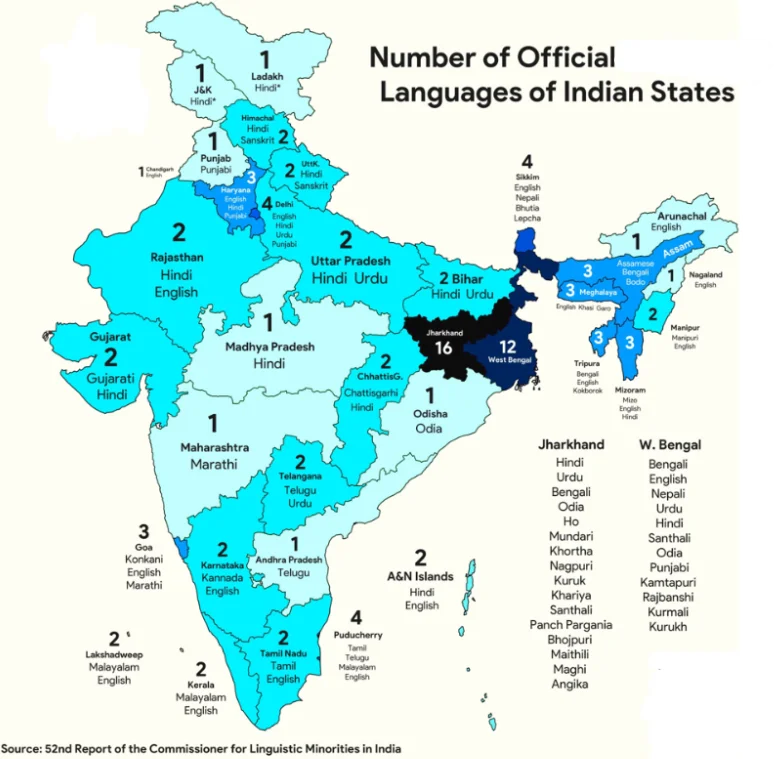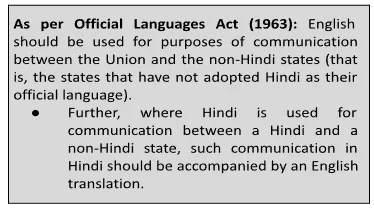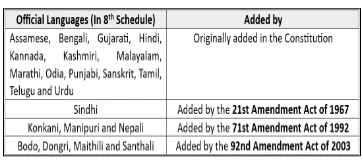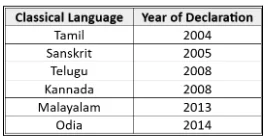India’s linguistic diversity is a vital part of its cultural identity, with no national language officially recognized. The Constitution, through Part XVII, outlines the framework for official languages in the country. This section addresses the language of the Union, regional languages, the language of the judiciary, and special directives, ensuring that all linguistic communities are represented and protected.
Enroll now for UPSC Online Course
Linguistic Diversity and Official Language Policy in India
Constitutional Provisions
- Language of the Union: Part XVII of the Constitution, Article 343, designates Hindi in Devanagari script as the official language of the Union, with provisions for the continued use of English.
- Regional Languages: Article 345 allows state legislatures to adopt any language in use in the state or Hindi as the official language for state purposes.
- Language of the Judiciary and Texts of Laws: Article 348 specifies that all proceedings in the Supreme Court and High Courts shall be conducted in English, and authoritative texts of laws must be in English unless otherwise provided by Parliament.
- Special Directives: Article 351 mandates the Union to promote the spread of the Hindi language and develop it as a medium of expression for all elements of India’s composite culture.
| Language of the Union |
|
|
|
|
Regional Languages
- The Constitution does not specify the official language of different states. It provides for the following provisions:
- State Legislature’s Authority (Article 345): As per Article 345, the Legislature of a State may by law adopt any one or more of the languages in use in the State or Hindi as the language or languages to be used for all or any of the official purposes of that State for which it was being used immediately before the commencement of this Constitution.

-
- Communication Between States and the Union (Article 346):
- Official Language for Communication: The language authorized for use in the Union for official purposes shall be the official language for communication between one State and another State and between a State and the Union.
- Agreement on Use of Hindi: If two or more States agree that the Hindi language should be the official language for communication between them, then Hindi may be used for such communication.
- Recognition of Minority Languages (Article 347): Article 347 (Special provision relating to language spoken by a section of the population of a State) says that, on a demand being made in that behalf the President may, if he is satisfied that a substantial proportion of the population of a State desire the use of any language spoken by them to be recognised by that State, direct that such language shall also be officially recognised throughout that State or any part thereof for such purpose as he may specify.
- The choice of the state is not limited to the languages enumerated in the Eighth Schedule of the Constitution.
- Authoritative Texts in English (Article 348): Article 348(1)(b) says that until Parliament by law otherwise provides, the authoritative texts:
- (i) of all Bills to be introduced or amendments to be moved in either House of Parliament or in the House or either House of the Legislature of a State,
- (ii) of all Acts passed by Parliament or the Legislature of a State and of all Ordinances promulgated by the President or the Governor of a State, and
- (iii) of all orders, rules, regulations and bye laws issued under this Constitution or under any law made by Parliament or the Legislature of a State, shall be in the English language.
- Communication Between States and the Union (Article 346):

- Hindi Translations as Authoritative Texts: As per Article 348(3), the state legislature can prescribe the use of any language (other than English) with respect to bills, acts, ordinances, orders, rules, regulations or bye-laws, but a translation of the same in the English language is to be published.
- The Official Languages Act of 1963: It lays down that Hindi translation of acts, ordinances, orders, regulations and bye-laws published under the authority of the President are deemed to be authoritative texts.
Language of Judiciary
- Article 348 (1)(a): (Language to be used in the Supreme Court and in the High Courts and for Acts, Bills, etc.) says that until Parliament by law otherwise provides, “all proceedings in the Supreme Court and in every High Court” shall be in the English language.
- However, the Parliament has not made any provision for the use of Hindi in the Supreme Court.
- Hence, the Supreme Court hears only those who petition or appeal in English.
- Article 348 (2) permits “the use of the Hindi language, or any other language used for official purposes of the State, in proceedings in the High Court having its principal seat in that State” after authorisation by the Governor and “with the previous consent of the President”.
- While the proceedings could be in any official language, Article 348 (2) mandates that “any judgement, decree or order passed or made by such High Court” must be in English.
Promoting Hindi as a National Language
- Promotion of Hindi: Article 351 (Directive for development of the Hindi language) provides that, it shall be the duty of the Union to promote the spread of the Hindi language, to develop it so that it may serve as a medium of expression for all the elements of the composite culture of India.
- Enrichment of Hindi: It also recommend to secure its enrichment by assimilating without interfering with its genius, the forms, style and expressions used in Hindustani and in the other languages of India specified in the Eighth Schedule, and by drawing, wherever necessary or desirable, for its vocabulary, primarily on Sanskrit and secondarily on other languages.
Official Languages Specified in the Eighth Schedule
- Current Official Languages: At present (2023), as per Eighth Schedule of the Constitution specifies 22 official languages (originally 14 languages) and Hindi is one of the official languages.

- Objectives Behind Specifying Regional Languages in the Eighth Schedule: In terms of the Constitution provisions, there are two objectives behind the specification of the above regional languages in the Eighth Schedule:
- Representation in the Official Language Commission: The members of these languages are to be given representation in the Official Language Commission; and
- Enrichment of Hindi: The forms, style and expression of these languages are to be used for the enrichment of the Hindi language.
Hindi as a National Language: Pros and Cons
| Pros | Cons |
|
|
The Three-Language Policy and Its Challenges
- Envisioned by the Kothari Commission: The three-language policy, currently ineffective, was envisioned by the Kothari Commission.
- Proposal for Language Introduction: It proposed introducing Hindi in non-Hindi states and a non-Hindi language in Hindi-speaking states.
- Implementation Issues: However, most non-Hindi states adopted Hindi, while Hindi-speaking states neglected non-Hindi language education.
- Need for Revamping: A revamped policy should empower citizens to choose languages, making the three-language formula effective.
Parliamentary Committee on Official Language
|
Classical Language and its Status
In 2004, the Government of India decided to create a new category of languages called “classical languages”. In 2006, it laid down the criteria for conferring classical language status. They are:
- High antiquity of its early texts/recorded history over a period of 1500-2000 years;
- A body of ancient literature/texts, which is considered a valuable heritage by generations of speakers;
- The literary tradition be original and not borrowed from another speech community;
- The classical language and literature being distinct from modern, there may also be a discontinuity between the classical language and its later forms or its offshoots.

- So far (2023), the 6 languages are granted classical language status.
- Benefits once a language is declared classical:
- It gets financial assistance for setting up a centre of excellence for the study of that language.
- It opens up an avenue for two major awards for scholars of eminence.
- The University Grants Commission (UGC) can be requested to create – to begin with at least in Central Universities – a certain number of professional chairs for classical languages for scholars of eminence in the language.
Enroll now for UPSC Online Course
| Must Read | |
| Current Affairs | Editorial Analysis |
| Upsc Notes | Upsc Blogs |
| NCERT Notes | Free Main Answer Writing |
Conclusion
The provisions for official languages in India are essential for preserving the country’s rich linguistic heritage.
- These measures promote inclusivity and protect minority languages, ensuring every voice is heard in a multilingual society.
- It is crucial for these initiatives to adapt and evolve, reflecting the dynamic nature of India’s cultural landscape.
| Related Articles mentioned in the Constitution | |
| Article 343 | Official language of the Union |
| Article 344 | Commission and committee of Parliament on official language |
| Article 345 | Official language or languages of a State |
| Article 346 | Official languages for Communication between one State and another or between a State and the Union |
| Article 347 | Special provision relating to language spoken by a section of the population of a state |
| Article 348 | Language to be used in the Supreme Court and in the high courts and for acts, bills, etc. |
| Article 349 | Special procedure for enactment of certain laws relating to language |
| Article 350 | Language to be used in representations for redress of grievances |
| Article 350 A | Facilities for instruction in mother tongue at primary stage |
| Article 350 B | Special officer for linguistic minorities |
| Article 351 | Directive for development of the hindi language |
Sign up for the PWOnlyIAS Online Course by Physics Wallah and start your journey to IAS success today!
| Related Articles | |
| Constitution: A Living Document | Indian Parliament |
| Official Language of India: Evolution, Constitutional Provisions & Feature | High Courts in India |

 GS Foundation
GS Foundation Optional Course
Optional Course Combo Courses
Combo Courses Degree Program
Degree Program









